Alpha Kappa Alpha Sorority was founded on January 15, 1908 on the campus of Howard University in Washington, DC. Its founders were among the fewer than 1,000 Negroes enrolled in higher education institutions in 1908 and the 25 women who received Bachelor of Arts degrees from Howard University between 1908 and 1911. Nine juniors and seniors who constituted the initial core group of founding members and seven sophomores who were extended an invitation for membership without initiation comprised what are acknowledged as Alpha Kappa Alpha’s original 16 founders. Led by Ethel Hedgeman (Lyle), the nine Howard University students who came together to form Alpha Kappa Alpha Sorority were the scholastic leaders of their classes. Each also had a special talent or gift that further enhanced the potential of this dynamic group.
The Original Nine: Anna Easter Brown, Beulah Burke, Lillie Burke, Marjorie Hill, Margaret Flagg Holmes, Ethel Hedgeman (Lyle), Lavinia Norman, Lucy Diggs Slowe and Marie Woolfolk (Taylor)
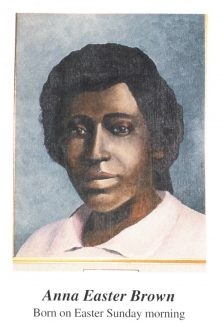
Born: 1879 – Died: 1957
Educator
Anna Easter Brown was the first treasurer of Alpha Chapter of Alpha Kappa Alpha. While at Howard University, Brown was an honor student, a library aide, a member of the school choir and a passionate writer. She graduated from Howard University in 1909 and began her teaching career in Bricks, NC, where she ultimately taught in Rocky Mount, NC for over 30 years. She also was the chartering president of Chi Omega Chapter of Alpha Kappa Alpha in that city in 1925. Brown was an advocate of history and was known especially for her annual Negro History Week exhibits that received national media attention.
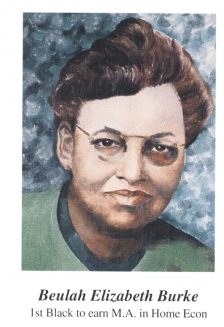
Born: 1885 – Died: 1975
Educator
Beulah Elizabeth Burke is credited with having created the name, motto and colors of Alpha Kappa Alpha Sorority. She became a charter member and president of Beta Omega Chapter in Kansas City, MO, a charter member and president of Mu Omega Chapter in Kansas City, KS and chartered the first three undergraduate chapters of the sorority that were established after incorporation.
Although she trained to be a language teacher, she demonstrated mastery in home economics, resulting in administrators requesting her to concentrate in the area and leading to a master’s degree in home economics. Ms. Burke taught in public schools (Kansas City, MO and Atlantic City, NJ) and at a state institution in Dover, DE, served as manager of a housing project (Atlantic City, NJ) and was director of a residence hall for female government employees (Washington, D.C.).
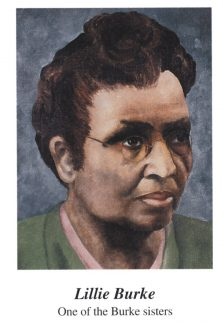
Birth: 1884 – Died: 1949
Educator
Lillie E. Burke enrolled in Howard University’s preparatory academy in tandem with her year-younger sister Beulah and subsequently they both enrolled in Howard’s College of Liberal Arts at the same time. At the time of the formation of the Sorority, Burke, like her sister, was an honor student, a Greek scholar and a senior. She is credited with having helped with the creation of the Alpha Kappa Alpha motto and was a charter member of Xi Omega Chapter, the first graduate chapter in the District of Columbia.
After graduation, Burke accepted her first teaching assignment at Downing Institute in Downingtown, PA, where she began a career where she distinguished herself as a gifted teacher.
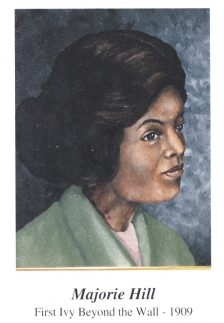
Birth: Unknown - Died: 1909
Educator
Marjorie Hill was a senior at Howard when she joined the small group that went on to form the sorority and graduated in May of 1908. She chose to pursue a teaching career at Morgan College in Lynchburg, VA immediately after her undergraduate degree was conferred.
Not much is known of Hill after she left Howard University as she died during the summer of 1909, becoming the group’s first Ivy Beyond the Wall (deceased member of AKA).
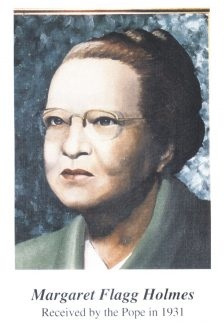
Birth: 1886 – Died: 1976
Educator
Margaret Flagg helped write Alpha Kappa Alpha’s first constitution and bylaws. It is through her recorded recollections about the personalities of the other original founders that the character sketches of those pioneering young women now exist for future generations of members. Nine years after her graduation, the talented teacher married and moved back home to her childhood home of Chicago.
Once back home, Holmes served as vice president and recording secretary of Theta Omega Chapter. Her community involvement continued with her involvement in the NAACP, the YWCA and the Chicago school system, which recognized her as an outstanding Latin teacher. An avid traveler, she toured the United States, Canada and Europe with her husband John.
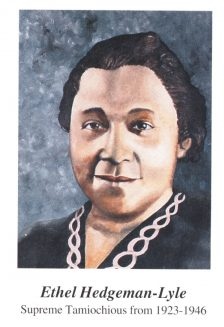
Birth: 1887 – Died: 1950
Educator
Ethel Hedgeman was the visionary and principal founder of Alpha Kappa Alpha Sorority. Her warmth and outgoing personality, combined with a strong desire to join with other collegians with like minds and exceptional talents for the betterment of themselves and mankind, propelled her to spearhead the movement that led to the founding of the nation’s first black sorority.
Hedgeman experienced numerous notable achievements in life and her career upon her graduation, among them marriage to George Lyle, being the first African-American to teach in a “normal” school in Oklahoma, founding the Mother’s Club of Philadelphia, being a charter member of the West Philadelphia League of Women Voters and chairing the Philadelphia Mayor’s Committee of 100 Women Sesquicentennial Anniversary of the Adoption of the U.S. Constitution. Within the sorority she played such an integral part in founding, she served as national treasurer for 23 years, was a charter member and president of Omega Omega Chapter in Philadelphia and was the only member ever to be named Honorary Supreme Basileus (International President).
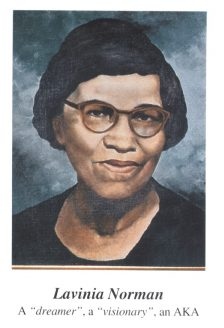
Birth: 1882 – Died: 1983
Educator
Lavinia Norman was a member of Alpha Kappa Alpha’s first Constitution and Bylaws committee and was the presiding officer at the first Ivy Day ceremony (when the sorority’s members planted sprigs of their symbol of strength and endurance at the south end of Miner Hall, the organization’s on-campus birthplace) before her graduation in May 1909. She settled in Huntington, WV and was an active member of Beta Tau Omega Chapter there for many years.
Norman was the last survivor of the original nine founders when she passed away at the age of 100, after serving the organization for over 75 years and serving professionally for over 40 years at Douglass High School in Huntington as a teacher of English, Latin and French, coach of the school’s winning drama team and advisor for the student newspaper.
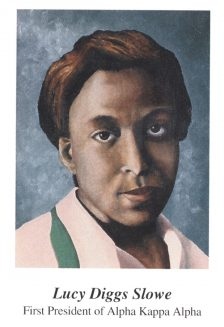
Birth: 1885 – Died: 1937
College Dean
A conscientious, hardworking and serious student, Lucy Slowe was the newly-formed organization’s first president, once its freshly-minted constitution and bylaws stipulated that the holder of the office should be in her senior term at the college. She also held the position of chairman on both the constitution and bylaws and nominating committees.
After graduating as valedictorian in 1908, Slowe began her teaching career at Douglass High School in Baltimore and later moved back to the District of Columbia to teach in high schools there. Her notable achievements included being the first black female college dean (Howard), the first black member of the National Association of Women Deans, Administrators & Counselors and winning the 1917 American Tennis Association national tournament in Baltimore, the first African-American woman to do so.
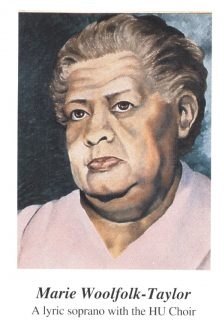
Birth: 1893 – Died: 1960
Social Worker
Because of her passion and strong-willed nature, Marie Woolfolk was selected by Ethel Hedgeman to help her make the case for a sorority to the Howard administration in the fall of 1907. Once the sisterhood was established, Woolfolk served as its first secretary, was a member of the first Constitution and Bylaws committee, she extended invitations to the Howard sophomores who were eventually added to the founding group. She became the chartering president of Kappa Omega Chapter in Atlanta.
To satisfy her desire to pursue a career in social work upon graduation, Woolfolk received post-graduate training as the only African-American student at Schauffler Missionary Training School in Cleveland, OH. She then relocated to her hometown of Atlanta to practice her craft at the First Congregational Church as a community assistant to the church’s first black pastor. Over the years, she also worked with the American Red Cross, the YWCA, the NAACP and was an organizer for Atlanta’s Community Chest, a precursor of the United Way.
With the exception of Ethel Hedgeman Lyle, the original group of nine women was comprised of college seniors. To ensure the continuity of the organization, seven Class of 1910 honor students who had expressed interest were invited to join without initiation.
The Sophomores: Norma Boyd, Ethel Jones (Mowbray), Alice Murray, Sarah Meriweather (Nutter), Joanna Berry (Shields), Carrie Snowden and Harriet Terry
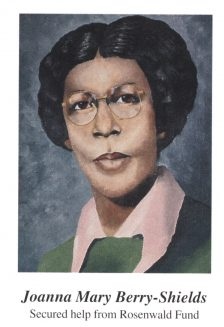
Birth: 1884 – Death: 1965
Educator
Joanna Berry, a distant relative of co-founder Lavinia Norman, was known for her dignity, poise and grace and served as custodian of Alpha Chapter’s records during the fall of 1909. After graduating in 1910, she began her teaching career at Manassas Institute, her former high school in Virginia and at other schools in North Carolina, New York and South Carolina.
After a 12-year hiatus from Alpha Kappa Alpha, Shields affiliated with Phi Omega Chapter in Winston-Salem, NC and later with Tau Omega Chapter in New York City when her family relocated there in 1937. Professionally, she helped to secure a grant that increased the school year from three to six months for African-Americans in South Carolina and maintained memberships in the NAACP, the Negro History Club and the National Council of Negro Women.
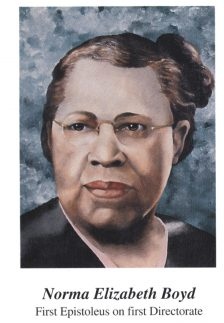
Birth: 1888 – Died: 1985
Educator
In addition to being one of the seven founders in the sophomore group, Norma Boyd was also an incorporator of Alpha Kappa Alpha and director of its National Non-Partisan Council (NPC) on Public Affairs, the nation’s first full-time minority lobby. She served as Alpha Kappa Alpha’s first national corresponding secretary, as president of Xi Omega Chapter in Washington, D.C. and as a North Atlantic Regional Director.
While engaged in a DC-based teaching career that spanned nearly 40 years, Boyd consistently rendered community service as a lifelong protector and advocate for civil liberties. Her diligence on this front earned her the distinction of being named an accredited observer of non-governmental organizations for the United Nations. Boyd was Alpha Kappa Alpha’s last surviving founder.
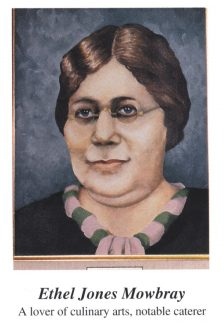
Birth: Unknown – Died: 1948
Culinary Artist
Like Lucy Slowe, Ethel Hedgeman, Lavinia Norman and Harriet Terry before her, Ethel Jones, one of the seven sophomores accorded founder status, became the president of Alpha Chapter of Alpha Kappa Alpha Sorority in the last semester of her senior year in 1910. And when the sorority’s existence was threatened in 1912, she worked with incorporator Nellie Quander to take measures to ensure its survival. After the sorority was chartered as Alpha Kappa Alpha Sorority, Incorporated, Jones was installed as vice president of the first board of directors (directorate).
After Jones graduated, she returned to her native Baltimore to teach math in the city’s public schools. It was there that she married her husband George in 1913 and then moved with him to Chicago where he was to pursue his graduate studies and then to Kansas City, KS, where he accepted a teaching position. At that time, the now Mrs. Mowbray was an active member of the local PTA and developed and actualized her passion for the culinary arts by becoming a caterer. She joined Mu Omega chapter upon its chartering in Kansas City in 1924.
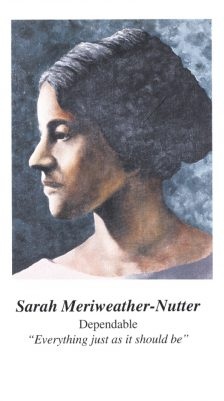
Birth: Unknown - Died: 1950
Educator
Sarah Meriwether’s father, James, was a Howard alumnus and trustee, so as his daughter, she was instilled with strong ties to the school and was involved in numerous campus activities. Among them was joining Alpha Kappa Alpha and delivering the oration at the May 1909 Ivy Day Celebration. It has been said that some of the ivy that grows on the grounds of Howard University to this day were planted there by Meriwether, who had a penchant for planting cuttings in prevalent spots throughout the campus. Her involvement in the sorority was so strong that it induced interest in her mother Mary Robinson Meriwether, who was inducted as an honorary member in 1913.
After graduating and moving to Charleston, WV with her husband T. Gillis Nutter, the founder helped to establish two chapters of Alpha Kappa Alpha: Nu Chapter at West Collegiate Institute (now West Virginia State University) in 1922 and Beta Beta Omega Chapter in Charleston in 1934. She also organized alumni and book clubs, chaired NAACP committees and became the first African-American member of the Virginia Society for Crippled Children.
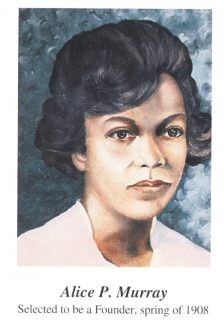
Birth & Death: Unknown
Educator
Alice Porter Murray was one of the founding sophomores invited to join Alpha Kappa Alpha Sorority in 1909. She quickly became an integral part of the literary and social activities sponsored by the group that benefitted the members and the public. Murray, who lived in the affluent and culturally vibrant U Street District of Washington, D.C., is said to have excelled at playing hostess at social gatherings. She was also a gifted writer, noted for her poetry, prose and cultural commentary.
Upon her graduation in 1910 with a degree in liberal arts and pedagogy, Murray lost contact with Alpha Kappa Alpha. Based on the numerous kindergarten methods classes she is said to have added to her curriculum, it is speculated that she pursued a teaching career after leaving Howard.
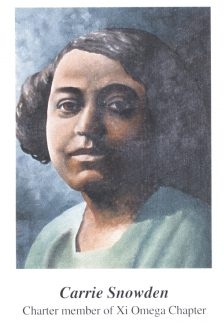
Birth: Unknown – Death: 1948
Educator
A sophomore when the sorority was founded in 1908, Carrie E. Snowden was one of those who took on the mantle of leadership as six of the original nine founders graduated that May. During the fall semester of 1909, she became the new sorority’s corresponding secretary.
Described as introverted and reserved, Snowden shunned the spotlight in favor of background roles in the group. After graduating in 1910 and teaching in DC and Baltimore schools, she returned to Howard to work as a switchboard operator. She became a charter member of Xi Omega Chapter in Washington, D.C. in 1923.
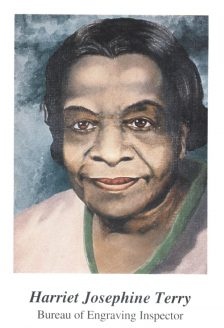
Harriet Josephine Terry
Birth: 1885 – Death: 1967
Educator
Remembered fondly for her captivating smile, Harriet Josephine Terry brought congeniality, intellect and organizational skills with her membership in Alpha Kappa Alpha. She was the first of the sophomores to assume the role of president in the sorority, succeeding Lavinia Norman in the fall of 1909 after Norman, Hedgeman and Brown, the last of the original nine founders to graduate, had completed their studies in the spring.
Terry was a skilled songwriter who composed a hymn for the sorority’s first induction ceremony in 1909 that was adopted as Alpha Kappa Alpha’s national initiation hymn (not to be confused with the sorority’s National Hymn, which was penned by member J. Marjory Jackson and approved as the official sorority hymn in 1941). After graduating in 1910, she was hired to chair the English and History department at Gloucester High School in Capahosic, VA Terry worked for a time for the Bureau of Engraving and Printing during World War I, but returned to teaching at Alabama A&M University in Huntsville in 1922, where she taught until she retired in 1959. In 1949, she became a charter member of Epsilon Gamma Omega Chapter in Huntsville and also assumed the roles as its president
INCORPORATORS
After attending a sorority meeting in 1912 where she heard proposals from then-current members to change the group’s name, colors, symbols and motto, Nellie May Quander (inducted in 1910; president of Alpha chapter from 1911-1912) realized that the need for an intervention to preserve the original premise of the sorority that she and its founders held dear was urgent. Quander quickly formed a committee comprised of a trio including herself and members Norma E. Boyd and Minnie Beatrice Smith—and later expanded to include sorority officers Julia Evangeline Brooks, Ethel Jones (Mowbray) and Nellie Pratt (Russell)—whose mission was to seek and acquire incorporation.
These women committed to Alpha Kappa Alpha fanned out to solicit the support of other like-minded undergraduate and graduate members who held true to the vows they had taken upon their initiation. The effort culminated in the successful protection and subsequent perpetuity of Alpha Kappa Alpha Sorority through its incorporation on January 29, 1913, with Quander, Boyd and Smith as signers of the petition. It was the first black Greek-letter organization to attempt and complete such a measure. The incorporation of the sorority positioned it to broaden its service concept offerings while ensuring the preservation of its founding principles and brands.